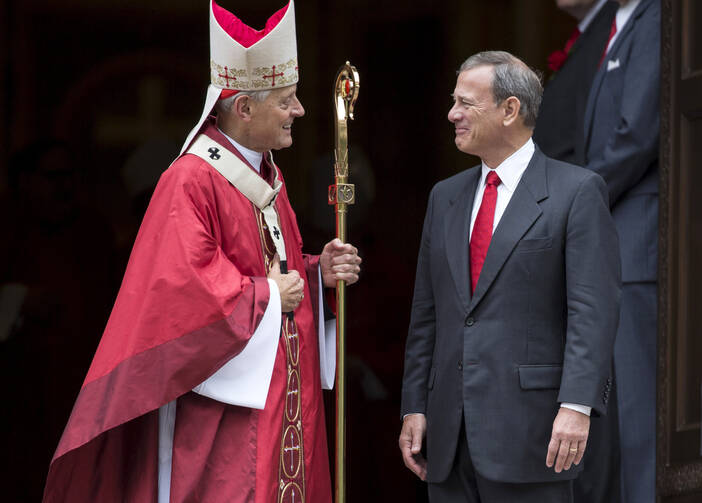For the 63rd consecutive year, the nation’s political nobility assembled beneath the Romanesque dome of the Cathedral of St. Matthew the Apostle in Washington, D.C., for the liturgical rite that marks the start of a new term for the U.S. Supreme Court. Sponsored by the John Carroll Society, the Red Mass (known as such because the priests wear red vestments), is a rare moment when leaders of church and state gather as one to invoke the blessing of God on those responsible for the administration of justice.
The first Red Mass was held in Washington in 1953. In succeeding years, the congregation has frequently included the president, the chief justice, associate justices, other leading jurists and members of Congress.
This year, in what some lightheartedly referred to as another five-to-four decision, five members of the U.S. Supreme Court took their seats in the first pew: Chief Justice Roberts was joined by Justices Scalia, Thomas, Breyer and Kennedy.
Archbishop Wilton Gregory of Atlanta delivered the homily, telling the at-capacity congregation that their work must effect a “greater spirit of understanding and unity” and that “during the course of this coming year—whether you are a judge, legislator, agency official, or citizen—you will be faced with many perplexing issues that will demand your careful attention and discernment.”
That is an understatement. As Ellen K. Boegel recently wrote for America: “Potential blockbusters already are on the docket and others are in the pipeline. The court is scheduled to hear cases regarding the death penalty, redistricting, free speech, affirmative action, tribal court jurisdiction and state water rights. The court also may take on appeals related to abortion rights and religious exemptions to the Affordable Care Act and same-sex marriage.”
That docket is politically turbo-charged, especially in light of the fact that the U.S. Supreme Court in recent decades has assumed a more robust presence in our national politics than was originally envisioned by our founders. If Justice Antonin Scalia and I were legislators, we would rarely vote the same way. But I have a great deal more sympathy for Mr. Scalia as a jurist, mainly because he has called our attention to the fact that the current modus operandi of constitutional interpretation can subvert the democratic process. The U.S. Supreme Court, says Justice Scalia, has extended its prerogative well beyond the power “to say what the law is” to include the power to say what the law should be, a power formerly enjoyed exclusively by the legislative department of government. “To allow the policy question of same-sex marriage to be considered and resolved by a select, patrician, highly unrepresentative panel of nine,” Justice Scalia wrote in his dissent in Obergefell v. Hodges, “is to violate a principle even more fundamental than no taxation without representation: no social transformation without representation.”
Let me be clear: Both supporters and opponents of same-sex civil marriage should be concerned about how the matter was settled. As America’s editors wrote in a recent editorial: “There is a serious constitutional principle at stake: We the people must consider whether we want major public policy questions like the definition of civil marriage settled by judicial fiat, rather than by our elected representatives or by direct vote of the people.” We need to change this trajectory if we aspire to be a democracy in more than name. But in order to change the system, we first need the courage to say that the process is flawed. More important, we need the courage to admit as much even when, especially when the process produces an outcome we might personally favor.








